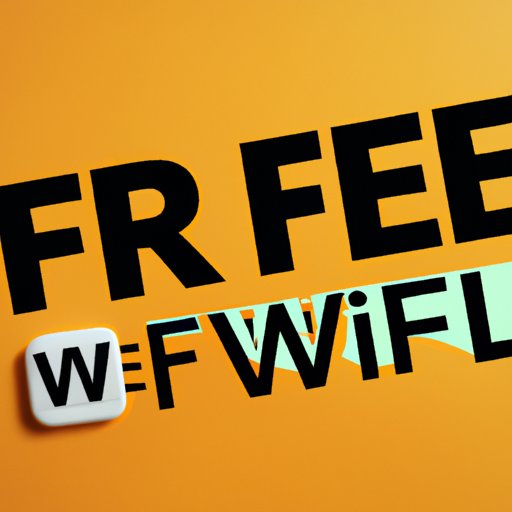
Introduction
In today’s world, the internet has become an essential utility that most people rely on for work, entertainment, education, and communication. However, the rising cost of home internet service can be a financial burden for some families and individuals. But, there are ways to get access to the internet without having to pay anything. In this article, we will provide several tips and tricks on how to get free internet at home.
Utilize Public Wi-Fi
Public Wi-Fi is a widely available resource that can be used for free. Many places provide free Wi-Fi, including libraries, coffee shops, restaurants, hotels, and airports. To connect to public Wi-Fi, you need a Wi-Fi enabled device and a password, which is usually provided by the establishment offering the Wi-Fi. Once you have entered the password, you can connect to the Wi-Fi network.
Using public Wi-Fi has advantages, such as saving money on a home Wi-Fi service. However, there are some potential drawbacks to consider, such as security concerns and slow connection speed due to heavy traffic on the network. Therefore, it is essential to use a secure Wi-Fi connection and not share any sensitive information when using public Wi-Fi.
Sign up for Free Trials
Internet service providers (ISPs) sometimes offer free trial periods to attract new customers. During the trial period, you can use the service for free, without having to pay anything. Some trial periods may last up to 30 days, giving you enough time to test the service and decide whether it’s right for you.
Some well-known ISPs that offer free trials include AT&T, Cox, Spectrum, and Xfinity. To take advantage of these free trials, you can visit the ISP’s website or call the customer service hotline to request the trial. It is essential to keep in mind that some ISPs may require a credit card or personal information during the sign-up process, so make sure to read the terms and conditions carefully. Also, make sure to cancel the service before the end of the trial period if you decide not to continue, to avoid being charged.
Use Hotspot from Your Phone
If you have a smartphone with a data plan, you can use your phone’s hotspot to create a Wi-Fi signal that your other devices can connect to. This option allows you to use your phone as a modem and share its internet connection with other devices, such as laptops and tablets.
The advantages of using a mobile hotspot include its portability, allowing you to take it with you wherever you go. However, using a mobile hotspot can be costly if you have a limited data plan. Therefore, it’s important to manage your data usage by only using the hotspot when necessary and disabling it when not in use.
Use Internet Service from Your Neighbor
If you have a friendly and helpful neighbor with a Wi-Fi network, you could ask to use their internet service for free. However, it’s important to approach the topic with care and respect for their privacy. Some neighbors may not feel comfortable sharing their internet connection, so it’s best to ask politely and explain the reason for your request.
One potential drawback of using a neighbor’s Wi-Fi is that you may be sharing their bandwidth, which can slow down their internet speed and create a conflict. Therefore, it’s important to follow etiquette rules, such as limiting your data usage and not using their Wi-Fi for any illegal activities.
Use Free Government Programs
There are several government programs that offer free internet service to low-income families and individuals. The Federal Communications Commission’s (FCC) Lifeline program and the ConnectHomeUSA program are two examples of government initiatives aimed at increasing access to the internet.
To be eligible for these programs, you must meet specific income requirements and be enrolled in a government assistance program, such as Medicaid or SNAP. To check your eligibility and apply for the programs, you can visit the program’s website or call the hotline number provided. It’s essential to note that the application process may take time, so it’s best to start early and be patient.
Use Free ISP Services
There are also some ISPs that offer free internet services, such as FreedomPop and NetZero. These providers offer a limited amount of data per month for free, with the option to upgrade to a paid plan if you need more data.
When looking for free ISPs in your area, it’s important to research the provider’s reputation, availability in your area, and data cap limits. Moreover, it’s essential to manage your data usage carefully to avoid overage fees or service interruption.
Conclusion
Getting free internet at home is a feasible option for those who cannot afford a home internet service. From using public Wi-Fi to signing up for government programs, there are several ways to get access to the internet for free. It’s important to explore these options carefully, taking into account potential drawbacks and avoiding any illegal activities when using the internet.




